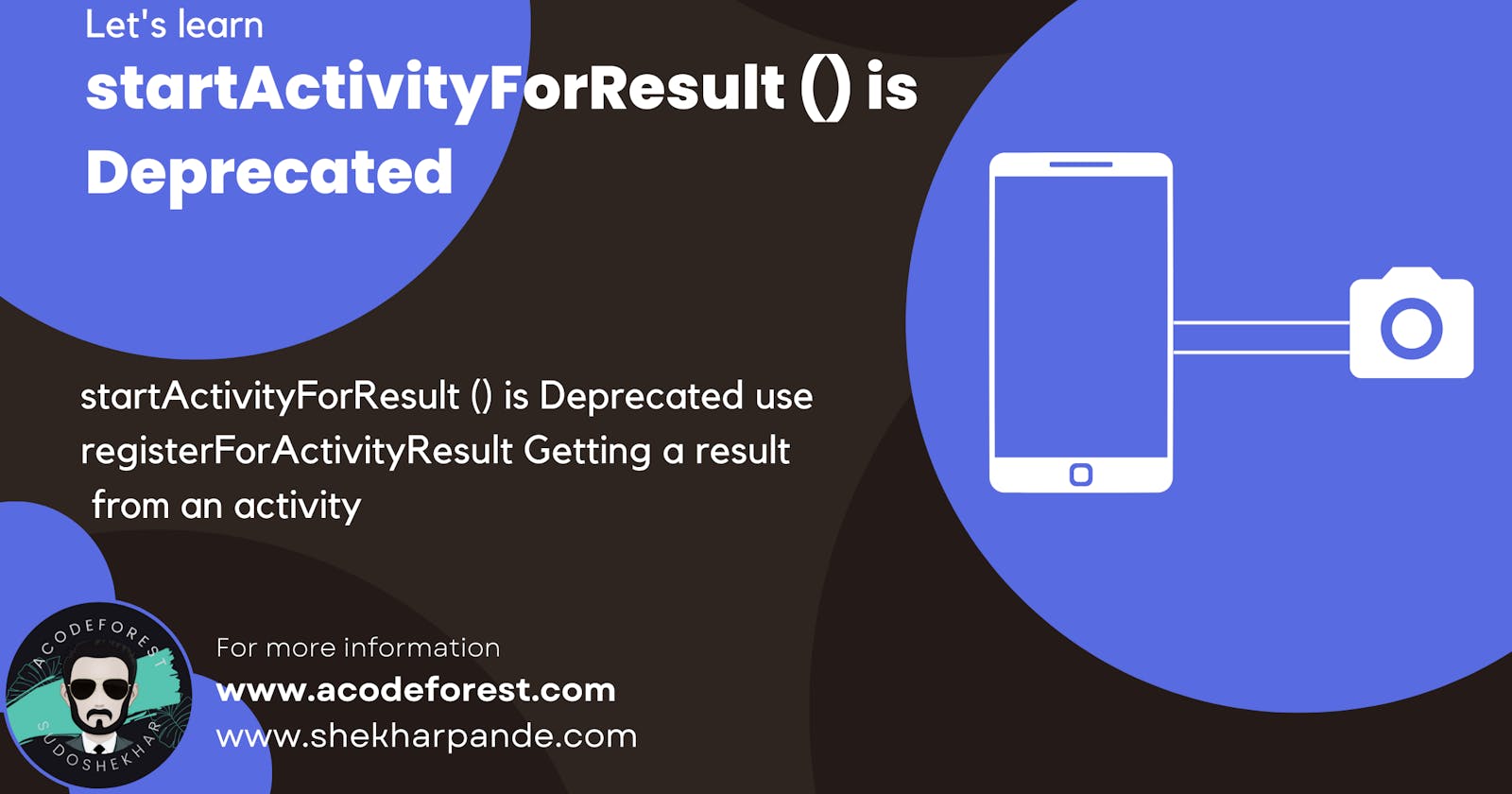startActivityForResult () is Deprecated use registerForActivityResult Getting a result from an activity
Starting another activity, whether one within your app or from another app, doesn't need to be a one-way operation. You can also start another activity and receive a result back. For example, your app can start a camera app and receive the captured photo as a result. Or, you might start the Contacts app in order for the user to select a contact and you'll receive the contact details as a result.
While the underlying startActivityForResult() and onActivityResult() APIs are available on the Activity class on all API levels, it is strongly recommended to use the Activity Result APIs introduced in AndroidX Activity and Fragment.
The Activity Result APIs provide components for registering for a result, launching the result, and handling the result once it is dispatched by the system.
Registering a callback for an Activity Result (What is need of it)
When starting an activity for a result, it is possible (and, in cases of memory-intensive operations such as camera usage, almost certain) that your process and your activity will be destroyed due to low memory.
For this reason, the Activity Result APIs decouple the result callback from the place in your code where you launch the other activity. As the result callback needs to be available when your process and activity are recreated, the callback must be unconditionally registered every time your activity is created, even if the logic of launching the other activity only happens based on user input or other business logic.
When in a ComponentActivity or a Fragment, the Activity Result APIs provide a registerForActivityResult() API for registering the result callback. registerForActivityResult() takes an ActivityResultContract and an ActivityResultCallback and returns an ActivityResultLauncher which you’ll use to launch the other activity.
An ActivityResultContract defines the input type needed to produce a result along with the output type of the result. The APIs provide default contracts for basic intent actions like taking a picture, requesting permissions, and so on. You can also create your own custom contracts.
ActivityResultCallback is a single method interface with an onActivityResult() method that takes an object of the output type defined in the ActivityResultContract:
val getContent = registerForActivityResult(GetContent()) { uri: Uri? ->
// Handle the returned Uri
}
Launching an activity for result
While registerForActivityResult() registers your callback, it does not launch the other activity and kick off the request for a result. Instead, this is the responsibility of the returned ActivityResultLauncher instance.
If input exists, the launcher takes the input that matches the type of the ActivityResultContract. Calling launch() starts the process of producing the result. When the user is done with the subsequent activity and returns, the onActivityResult() from the ActivityResultCallback is then executed, as shown in the following example:
```val getContent = registerForActivityResult(GetContent()) { uri: Uri? -> // Handle the returned Uri }
override fun onCreate(savedInstanceState: Bundle?) { // ...
val selectButton = findViewById<Button>(R.id.select_button)
selectButton.setOnClickListener {
// Pass in the mime type you'd like to allow the user to select
// as the input
getContent.launch("image/*")
}
}
**Receiving an activity result in a separate class**
While the ComponentActivity and Fragment classes implement the ActivityResultCaller interface to allow you to use the registerForActivityResult() APIs, you can also receive the activity result in a separate class that does not implement ActivityResultCaller by using ActivityResultRegistry directly.
For example, you might want to implement a LifecycleObserver that handles registering a contract along with launching the launcher:
class MyLifecycleObserver(private val registry : ActivityResultRegistry) : DefaultLifecycleObserver { lateinit var getContent : ActivityResultLauncher
override fun onCreate(owner: LifecycleOwner) {
getContent = registry.register("key", owner, GetContent()) { uri ->
// Handle the returned Uri
}
}
fun selectImage() {
getContent.launch("image/*")
}
}
class MyFragment : Fragment() { lateinit var observer : MyLifecycleObserver
override fun onCreate(savedInstanceState: Bundle?) {
// ...
observer = MyLifecycleObserver(requireActivity().activityResultRegistry)
lifecycle.addObserver(observer)
}
override fun onViewCreated(view: View, savedInstanceState: Bundle?) {
val selectButton = view.findViewById<Button>(R.id.select_button)
selectButton.setOnClickListener {
// Open the activity to select an image
observer.selectImage()
}
}
}
``` When using the ActivityResultRegistry APIs, it's strongly recommended to use the APIs that take a LifecycleOwner, as the LifecycleOwner automatically removes your registered launcher when the Lifecycle is destroyed. However, in cases where a LifecycleOwner is not available, each ActivityResultLauncher class allows you to manually call unregister() as an alternative.

